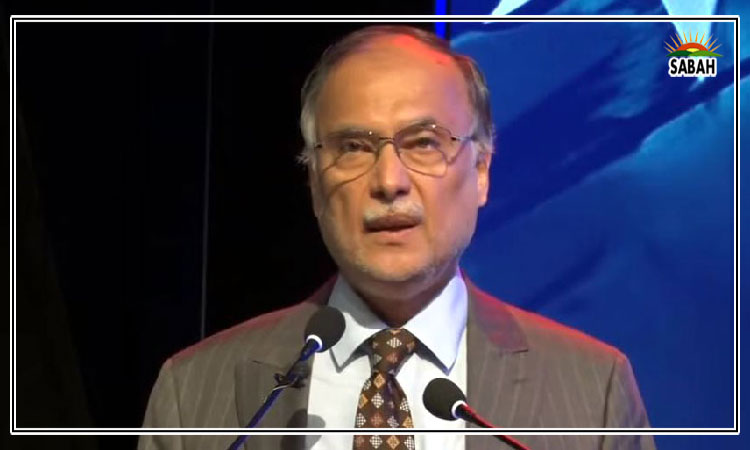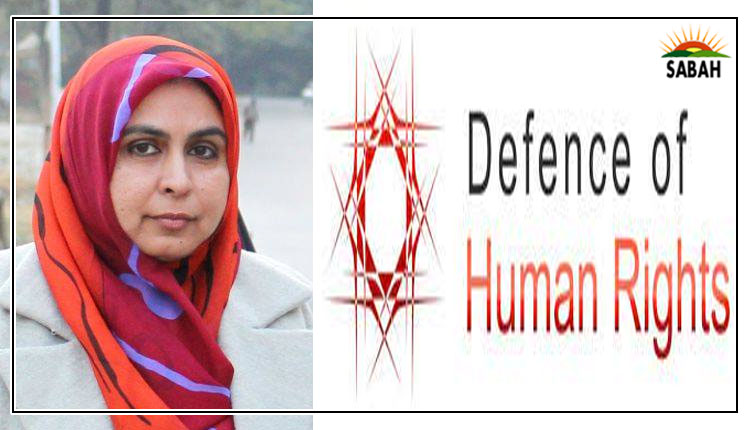DHR expresses solidarity with all female relatives of victims of enforced disappearances & their families across the world: Amina Masood Janjua
ISLAMABAD, March 08 (SABAH): Chairperson Defense of Human Rights Pakistan Amina Masood Janjua has said that Defence of Human Rights expresses solidarity with all the female relatives of the victims of enforced disappearances and their families across the world. She said that DHR pays a tribute to all women on the International Women’s Day who are struggling to find their loved-ones.
This was stated by Amina Masood Janjua in a statement issued on the occasion of the International Women’s Day observed on Friday.
She said that International Women’s Day is a global day observed on 8th March to celebrate the social, economic, cultural and political achievements of women without regard to divisions, whether national, ethnic, linguistic, cultural, economics or political; while also making a call to action for strengthening gender equality and accelerating women’s empowerment.
Amina Masood Janjua said that since those early years, International Women’s Day has assumed a new global dimension for women in developed and developing countries alike. The growing international women’s movement, which has been strengthened by four global United Nations women’s conferences, has helped make the commemoration a rallying point to build support for women’s rights and participation in the political and economic arenas.
Amina Masood Janjua said that this year, Defence of Human Rights Pakistan, aims to highlight the struggle and issues of women in the face of enforced disappearances. She said that enforced disappearance is perhaps the worst form of human rights violation that affects not only the person who disappeared but also his/her entire family. She said that everyone working around the issue of enforced disappearance agrees that an overwhelming majority of persons who have disappeared are men, very often leaving behind women in the family to deal with the numerous consequences.
She said that the enforced disappearance brings with it an array of problems that the family has to deal with – financial, social, psychological, and legal. The burden of dealing with these issues falls upon the women. In addition to the tireless search for the whereabouts of the disappeared, women are in a constant battle for survival in a generally patriarchal society. She said that shouldering the economic responsibility of the family is one of the biggest challenges that women face, especially since fending for the family is essentially considered as the male domain in conventional societies. Apart from this, women become responsible for the psychological health of the rest of the family members who are dealing with the loss of a beloved and hoping for his surfacing. The struggle for truth and justice is long and tiring. Threats and intimidation to women seeking answers about the fate of their loved ones are common, she said.
Amina Masood Janjua said that according to the research conducted by Defence of Human Rights Pakistan, 98% of the women feel insecure without their husbands and 90% of women face psychological stress. The stress is mainly due to economics and emotional issues they struggle with in the face of the disappearances which usually results in miserable financial situations like disruption in the education of the children or sometimes not being able to provide food for the children.
She said that the study showed that overall women left behind go through devastating situations in the face of disappearances.
She said that in the cases handled by the Defence of Human Rights, numerous women have been waiting for their husbands for a decade or more. These women could move on with their lives by remarrying if they knew where their husbands are. Additionally, these families also struggle with inheritance issues. She said that Pakistan does not acknowledge enforced disappearances officially, unlike countries such as Sri Lanka, which issues Certificates of Absence for such cases. She said that providing these certificates could help resolve the problems faced by families of disappeared individuals.
Amina Masood Janjua said that the international community must unite against the atrocities in Palestine. Women and children suffer torture, women face harassment, and the people lack access to basic necessities like water and food. Despite this, Islamic nations remain silent. It’s time to stand up for our Muslim brothers and sisters. We urgently need unified action, including boycotting Israeli products, to address this issue.
She said that in relation to the case of disappearances, DHR has registered 3100 enforced disappeared persons across Pakistan. This issue is not just restricted to Pakistan; Bangladesh, India, Indonesia, Philippines etc. have increasing and ongoing cases of disappearances. In order to prevent and respond to all forms of gender-based violence related to enforced disappearances, states should develop national programs and procedures, based on a holistic and multi-disciplinary approach. These should include adoption of relevant legislation, provision of financial resources and establishment of national machineries addressing discrimination and promoting women’s rights, equality and empowerment.
She said that the states must not only adopt protective measures, but should also take affirmative action in all spheres in order to strengthen women’s effective and equal participation in the prevention and eradication of enforced disappearances. These measures should primarily be aimed at removing institutional barriers that prevent women victims of enforced disappearances from enjoying their human rights fully and equally and on the same basis as men. She said that those measures should also ensure equality in reporting of enforced disappearance and guarantee that reports shall not be treated differently in light of the sex of the reporting person.












